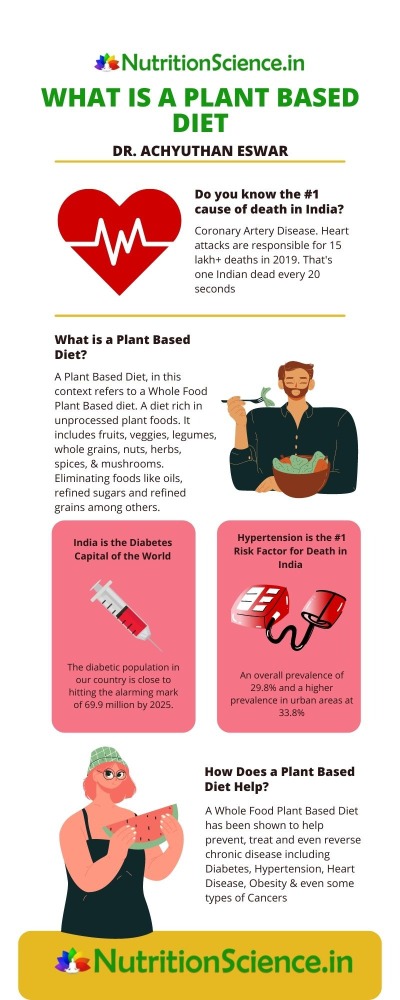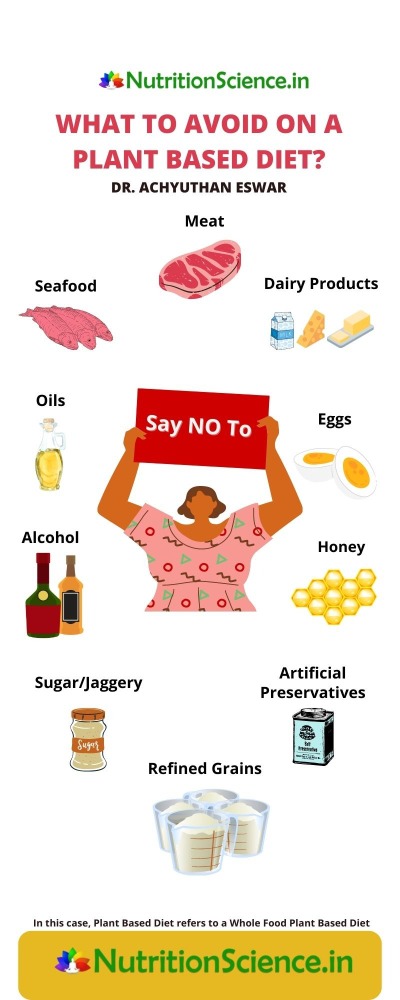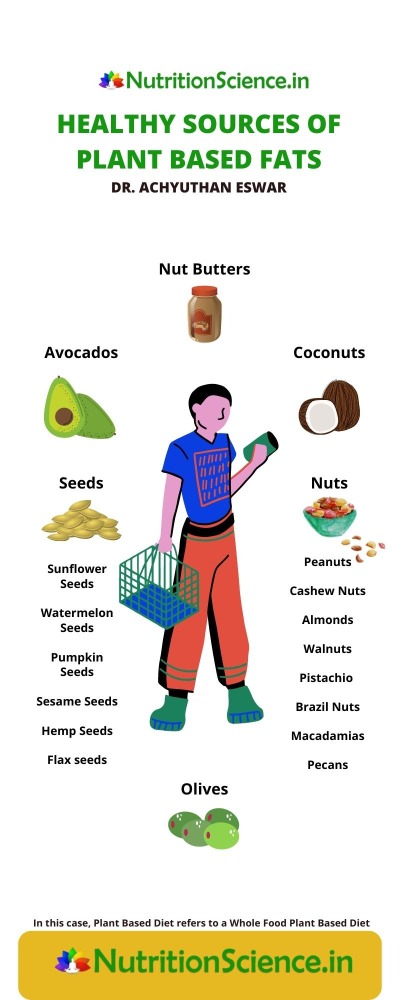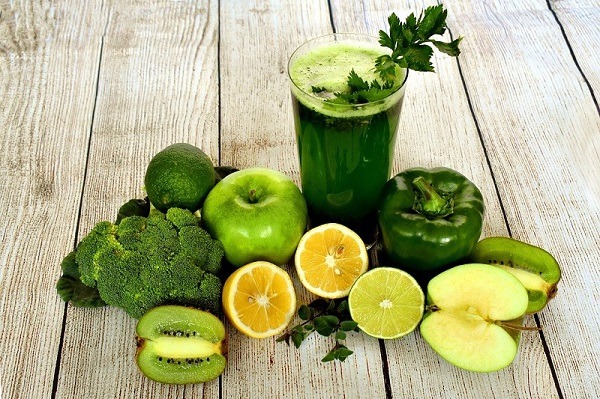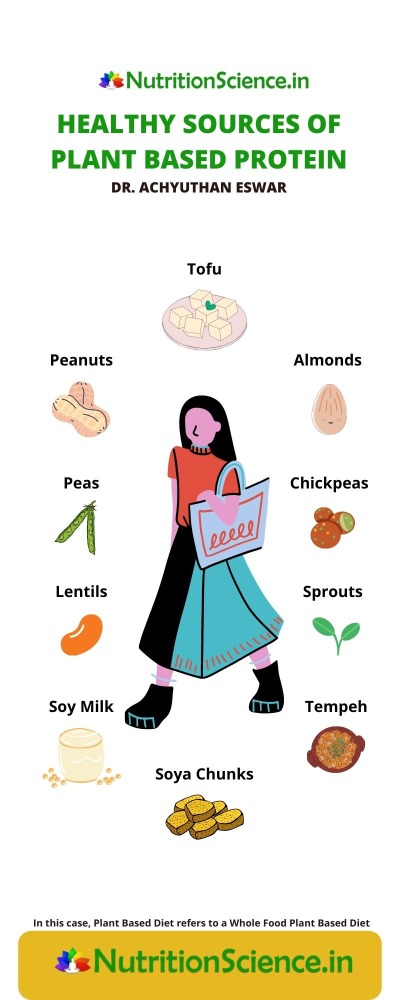There are no items in your cart
Add More
Add More
| Item Details | Price | ||
|---|---|---|---|
Dr. Achyuthan Eswar & Team
Discover the Easiest Ways to Eat Healthier & Upgrade Your Lifestyle with Scientifically Proven Ways to Prevent & Reverse Chronic Lifestyle Diseases through Easy-to-Follow Online Courses
So you’ve heard a little about plant based diets. You’ve seen the documentaries like Forks Over Knives and The Game Changers, read the books, watched the news headlines. But what exactly is plant based food, and how can you start eating more of it? What kind of impact does it have on your health? Does it help with weight loss? Is it affordable?
A plant based diet or plant-based foods, simply put, is a diet that does not contain any animal products - this includes all kinds of meat, fish, eggs, dairy foods and honey. The basic idea is to eat what comes from plants and nothing that comes from animals
A Healthy Plant-Based Diet has a range of health benefits, especially with diets rich in primarily unprocessed plant foods
Association between plant based diets and chronic disease reversal have been found
They help prevent, treat and reverse chronic disease that are triggered by lifestyle
They help with better weight management and lowers insulin resistance
Several studies stand testament to this Adventist Health Studies, Health Professionals Follow-Up Study, The China Study, studies of a Low-Fat Vegan Diet
With the aim of helping each one of you achieve optimal health, I have put together the 'Plant Based Diet Masterclass'. A comprehensive evidence-based Masterclass to learn about Nutrition and how it affects your health. All you need to know about a Whole Food Plant Based Diet, completely evidence based with a focus on easily making the switch in your everyday life.
I have broken down decades of scientific research into over 100 bite-sized videos lessons, with a focus on the Indian context, to help you #BeYourOwnDoc. Through my intensive course, you can optimise your health, prevent and manage chronic diseases, and potentially reduce your requirement for medication.
The Plant Based Diet Masterclass teaches you to practically incorporate these aspects of healthy living and integrate it with your lifestyle. My team and I will teach you to make delicious alternatives for your favourite dishes and formulae to make new healthy dishes so you get the best of both worlds - health & taste.
Kavitha Sreedharan
Founder, Chingari Store, Chennai
Comparison Chart: Vegan| Plant Based | Whole Food Plant Based
Veganism is a social justice movement that stands against the commodification of animals in all walks of life. Diet is one part of it. One's diet is entirely from plant products and not from animal products. This is what is commonly referred to as a 'Vegan Diet'. Clothing, accessories, cosmetics, and entertainment that use animals are avoided by vegans. Many of the documentaries about a plant based diet talk about the ethics of commodification of animals including ones like Forks over Knives and What the Health
The term plant based diet refers to a diet that does not include animal products or food derived from animals. Whole Food adds another dimension to this. As the name goes Whole-Foods, Plant-Based Diet is just that! What this means is a diet largely composed of unprocessed plant foods. This means a variety of fruits, berries, vegetables, greens, pulses and legumes, nuts and seeds, whole grains, herbs and spices, and mushrooms. All this in their whole form - with the fiber intact- without removing components. A complete avoidance of food from animal sources, including dairy products, meat, fish, and eggs, and processed foods including oil, sugar/jaggery, white rice, maida, rava, semiya, etc.
Dr. Colin Campbell conducted the world's largest epidemiological study called The China Study. When he compared the diets and health status of rural Chinese to Americans, he found that the top killers in the US - heart disease and cancers - were practically absent in China!
His research showed that this was primarily due to their diet and lifestyle. Animal foods seemed to be the top dietary cause of these diseases, so he named the healthy diet the Chinese followed, the 'Plant Based Diet' in 1982
He quickly realised that this definition alone is not enough. By definition, chips and soda are still plant based. So, he added another dimension to the definition and called it the 'Whole-Foods, Plant-Based Diet'
In practice many people choosing plant-based eating or plant centered diets tend to do so for health or environmental benefits, owing to the many benefits of plant based dietary pattern and unsustainable practices of food production, especially animal agriculture
Among those who choose the diet for health reasons, there is a tendency to eat a more whole-foods, plant-based diet and fewer calories from processed foods, but this differs from person to person
If you are choosing to move towards a vegan or plant-based or vegetarian diet for health reasons, we recommend further upgrading to a whole-foods, plant-based diet and make it your new lifestyle
It will increase your chances of better results for your specific health concern, and will reduce your risk of type 2 diabetes, risk of cancer, chronic kidney disease (renal disease), cardiovascular disease, weight loss if you are overweight and better weight management thereafter
Whole-Foods, Plant-Based Diets are not diets in the traditional sense of the word. They are a way of eating that encompasses foods that are health promoting - unprocessed plant foods and mushrooms. A well planned whole-foods, plant-based diet has many health benefits. It has been shown to prevent, treat and in some cases potentially reverse chronic illnesses including diabetes, blood pressure, coronary artery disease, obesity, asthma, and even some types of cancers. Apart from this, eating a wide variety of unprocessed plant foods improves overall health, skin, hair and energy levels. Unlike traditional diets, it does not call for portion restriction or elimination of a single macronutrient
Vegetarian diets and vegan diets tell me what you DON'T eat, but they don't tell me what you eat.
- Dr. Michael Greger, Founder, NutritionFacts.org
On a Vegetarian diet, people avoid meat, fish and eggs. Lacto-Ovo Vegetarians avoid meat and fish. Vegans avoid dairy products and honey and even fall into the category of plant-based eating. But they could be consuming plenty of refined food on a vegan or vegetarian diet such as refined sugar from sugary drinks and trans fats from oily food, and refined carbohydrates, all of which increase risk for heart disease, insulin resistance, and other negative health outcomes. On the other hand, whole-food, plant-based diets tells me what you DO eat - a diet rich in unprocessed plant foods. This means no eggs, no dairy products. Nothing that comes from animals, only plant derived ingredients and ones that are unprocessed.
Simple changes like using brown rice instead of white rice, baking pakodas instead of frying them, using nut butters and nutritional yeast instead of dairy butter and cheese, sautéing in water instead of oil, and using plant based milks such as whole almond milk or coconut milk can go a long way towards enhancing your nutritional intake. A well balanced whole-food, plant-based diet is the best upgrade you can make to your life for better health, energy levels, and mood
Diets don't work. You go on a diet & you go off it, back to what you were eating before. When you start eating Whole Food Plant Based food, it becomes a lifestyle, giving you permanently better health
- Dr. Achyuthan Eswar, Lifestyle Physician, Co-Founder NutritionScience.in & SampoornaAhara.com
Do you know what is the #1 cause of death in India? Coronary Artery Disease. Heart attacks are responsible for 15 lakh+ deaths in 2019. That's one Indian dead every 20 seconds. The good news is coronary artery disease is preventable, treatable, and even potentially reversible in a majority of patients through a whole food plant based diet, exercise and meditation.
If you have been diagnosed with heart disease, this is the best bet to get your body and mind back on track!
The reasons for high prevalence and risk for heart disease in India includes a diet high in saturated fats, refined sugars, simple carbohydrates, and sedentary lifestyle among others
A whole food plant based diet is the only therapy proven to effectively reverse heart disease in a majority of patients.
When you upgrade to eating unprocessed plant foods, you automatically eliminate saturated fats, refined sugars and simple carbohydrates from your diet in one clean sweep
This combined with regular physical exercise and good stress management practices lowers your risk for heart disease which is the leading cause of death among people in India
A clinical trial by Dr. Dean Ornish, demonstrated that intensive lifestyle changes may lead to regression of coronary atherosclerosis after 1 year
Forty-eight patients with moderate to severe coronary heart disease were randomly split into 2 groups. Thirty-five of them completed the 5-year follow-up quantitative coronary arteriography
One group underwent the usual care for their condition, this was the control group. The other group was guided to make intensive lifestyle changes
The group that underwent intensive lifestyle changes were on a low-fat whole foods, plant-based diet, exercised everyday. They had stress management training, did not smoke, & had group psychosocial support for 5 years
At the end of 5 years the group that had had the intensive lifestyle intervention not only had fewer heart attacks but also showed improvement in their condition with their arteries opening up and damaging reversing
As compared to the control group who had a higher number of heart attacks and progressive worsening of the disease
The remarkable outcomes of this study among others, put Plant-Based Nutrition specifically Whole-Food, Plant-Based Diets on the map
A Whole Food Plant Based Diet, along with other healthy lifestyle changes is the only therapy proven to reverse atherosclerosis in a majority of patients
What you eat is probably killing you slowly. Your diet increases your risk of heart disease and is the #4 risk factor for death if you live in India
There is a simple yet powerful method to prevent and even reverse chronic lifestyle disease. Eliminate the root cause of the disease and the body heals itself
- - Dr. Achyuthan Eswar, Lifestyle Physician, Co-Founder NutritionScience.in & SampoornaAhara.com
Plant Based diets have shown to decrease overall mortality, help with weight loss, reduce risk of renal disease, asthma, PCOS, diabetes, hypertension, hearth disease, and even some types of cancers.
They have been show to lower inflammation and accelerate healing. Improved energy levels, sleep, better skin and hair too!
While the problems manifest differently, they have the same root causes and therefore call for the same solutions. The benefits of Plant-Based eating patterns, regular physical exercise and good stress management practices are clear
The diabetic population in our country is close to hitting the alarming mark of 69.9 million by 2025
The risk of type 1 diabetes among children and the risk of type 2 diabetes among adults has been increasing rapidly
Diet is again at the root of this. Rising blood sugar levels due to insulin resistance goes back to the consumption of food from animal sources and processed foods. Association between plant-based eating patterns and improvement in insulin sensitivity have been found
Healthy eating, one centered around a plant-based or vegetarian diet without dairy products, has been shown to help diabetics not only better keep their blood sugars under control but additionally decrease insulin resistance and potentially reduce medication
During 4.1 million person-years of follow up of participants in the Nurses' Health Study, Nurses' Health Study II, and Health Professionals Follow-up Study, Malik et al., found that individuals in the highest quintile of animal protein consumption had a 13% increased risk of type 2 diabetes (95% CI: 6–21) compared with those in the lowest quintiles (pooled multivariate model including body mass index)
People on the low-fat vegan diet reduced their HbA levels by 1.23 points, compared with 0.38 points for the people on the American Diabetes Association diet
Hypertension or High Blood Pressure is one of the most common non-communicable diseases in India, with an overall prevalence of 29.8% and a higher prevalence in urban areas at 33.8%
Hypertension is the #1 Risk Factor for Death in India. With its roots in our lifestyle predominantly diet, High Blood Pressure can be prevented and potentially reversed
In the Adventist Health Study 2 cohort, vegans had approximately half the odds of having hypertension as non vegetarians, even after adjustment for body mass index.
Plant-based diets―i.e., eating patterns that emphasize legumes, whole grains, vegetables, fruits, nuts, and seeds and discourage most or all animal products―are especially potent in preventing type 2 diabetes (lowering insulin resistance) and have been associated with much lower rates of obesity, hypertension, hyperlipidemia, cardiovascular mortality, and cancer.
If this isn't reason enough, Vegan or Plant-Based Diet with a focus on whole foods are anti inflammatory, packed with antioxidants, lower risk of several chronic lifestyle illnesses, leads to a decrease in mortality, increase in energy levels, better skin and hair. The list is endless.
In India today, our diet is getting closer to the Standard American Diet. Even on a vegetarian diet, there is an increase in amounts of animal fats, animal sources of protein consumption in the form of dairy foods
The overall increase in the amounts of animal foods is combined with a sharp increase in processed foods such as refined sugars, carbs, oil. Eating out, ordering in & use of packaged food at home has shot up
No wonder our risk of diabetes owing to insulin resistance, higher body weight leading to obesity, and other chronic illnesses are skyrocketing. Today, even more than ever, the focus on healthy eating is important
Obesity, Heart Disease, Diabetes due to insulin resistance, and High Blood Pressure are some of the comorbidities that may delay recovery and increase risk of succumbing to Covid-19.
Plant-based or vegetarian diet minus dairy foods and with an exclusive focus on different types of plant foods is key. You can get all your required nutrients from plants as long as you are eating a balanced diet. Carbohydrates from starchy vegetables like sweet potatoes, calcium from leafy vegetables like amaranthus, plant proteins (including all essential amino acids) from a variety of beans, like black beans, Omega-3 Fatty Acid from Flaxseeds and healthy fats from whole nut milks like Coconut Milk.
One of the most common questions I get is "Where can I get healthy fats from if we don't consume some oil or at least ghee?"
The answer is from the healthiest source of course, Whole Nuts, Seeds, Olives and Avocados! Whole Plant Based Fats from these sources are the best bet. Fats from Meat, Dairy, and Oil are not only high in saturated fats but in addition, don't have any fiber. They are associated with a whole host of Chronic Lifestyle Diseases
Scientific evidence is clear that eating nuts does not make you fat. Peanuts and peanut butter are one of the top sources of arginine, a type of amino acid involved in protein synthesis. A 2010 study suggests that the arginine content of nuts may boost fat–burning in the body. Which means that not only are they much healthier, but also promote weight loss. It's best to keep animal fats off the table for overall better quality of life and higher mortality
There is absolutely no need for animal fats, animal protein consumption or any other animal-derived foods for complete nutrition. In fact, Saturated fat, found in animal fats and some plant based oils, has been associated with oxidative stress, mitochondrial dysfunction, and insulin resistance in numerous metabolic and epidemiologic studies as well.
While it sounds good in theory, whole-food, plant-based diets sound restrictive. What about all your favourite foods?
On the one hand, you have to include nutrient-rich foods like citrus fruits, cruciferous vegetables, leafy greens, and green vegetables, on the other you want to enjoy potato chips, tacos, and pizzas
The best part is that you can! Your Plant-Based Meals can be as fun and full of variety as you want it to be. As long as your food source is plant based and unprocessed, you can cook it, roast it, bake it, grind it and with some imagination and skill you can make a whole variety of delicious dishes
You can make dishes including pizzas, pastas, chocolates, sweets, snacks, burgers, dosas, cakes, and cookies. These will be just as yummy and yet packed with all the nutrients you need from wholesome plant sources
A well-balanced, plant-based diet will provide adequate amounts of essential amino acids and prevent protein deficiency. Moreover, substitution with plant protein conferred a significant 21% decrease in all-cause mortality risk
As found in the Health professionals follow-up study, consumption of animal protein is associated with an increased risk of diabetes (higher insulin resistance). Other studies have found a link between animal-protein and renal disease. This goes to show that Plant-Based Protein is not only sufficient but better for overall health and lowers overall mortality
NutritionScience.in by Punarpoosam Health Foods Kitchen Service Private Limited & Pavitraka Charitable Trust
184, Sri Raghavendra Complex, Link Road, 3rd Cross, Malleswaram Bangalore, Karnataka, India - 560003
P: +91 6366799911
© Copyright 2020 PHFKS Pvt Ltd
 Launch your Graphy
Launch your Graphy
